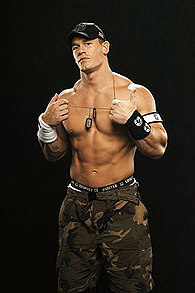 John Cena
John Cena
'The Life of John Cena: Revealed'
Let’s be honest: hailing from the rolling hills and broad valleys that constitute West Newbury, Mass., will likely never earn you “street cred”--unless, of course, you’re John Cena. Then again, it didn’t happen overnight for him, either. Long before he became the Dr. of Thuganomics, young Cena had to endure the neighborhood rocker kids’ taunts about his baggy pants and rayon Kwamé shirts. His love for freestyling lyrics about rebellion and individualism just didn’t fit within the small rural community.
After applying to more than 60 colleges (and being accepted by 58), Cena attended Massachusetts’ Springfield College, where he excelled as a Division III All-American offensive lineman and team captain for the Pride. But as much as he fondly remembers his college football accomplishments, he’s equally as proud of earning his degree in Exercise Physiology, which he attributes to making him a smarter, more durable performer in the ring today.
Though a huge WWE fan since childhood, rooting for heroes like Hulk Hogan, Ultimate Warrior, and Shawn Michaels, Cena had honestly never even considered a career in sports-entertainment. Instead, he flew out to California in 2000, to pursue a profession in bodybuilding. But while working behind the counter of Gold’s Gym in Venice, a discussion with a wrestler-in-training encouraged Cena to enroll in classes at Ultimate Pro Wrestling. He was instantly hooked, and became motivated to learn everything he could about his newfound craft. He obviously proved a quick study; within a year, World Wrestling Entertainment signed Cena to a developmental contract to train at Ohio Valley Wrestling. By June 2002, he had joined the SmackDown roster, and less than a year later headlined the first of what has since become countless main-event matches.
That said, Cena has never forgotten his roots. In fact, remembering where he came from has helped him evolve into the man he is today: a well-versed hip-hop artist, a successful movie star and a blue-collared Chain Gang Soldier who’s always ready to fight. In his jean shorts and Reebok Pumps, he leads his WWE fan-based army into battle with the mission statement he’s been down with since Day One: hustle, loyalty and respect.
Indeed, his new 3-Disc DVD 'John Cena: My Life' gives fans a visual glimpse of why Cena is one of the most popular WWE Superstars of all time. The three-time WWE Champion, WrestleMania® headliner, pop-culture icon, movie-starring actor lays it all out in the open here. 'John Cena: My Life' is a 3-disc DVD chronicling Cena’s amazing career in and out of the ring, with interviews from friends, family and fellow WWE Superstars, plus Cena himself introduces seven key matches. Extras include a first ever look into Cena’s extensive car collection and more than two hours of Cena’s popular “Five Questions” video from www.WWE.com.
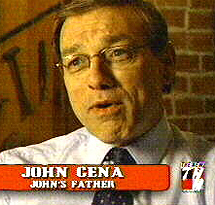 Taking it from the top and I asked John to talk more about the influence his dad had had on him growing up John Cena: - "The old man was great. My dad, to this day, is still very involved in wrestling and actually wrestles on the local independent scene every weekend as a manager. But his father was extremely into wrestling. Therefore, my father and my grandfather kinda bonded through wrestling. And before that my dad wasn't a real sports-orientated guy; not a dad to take me to the local ball park or enjoy the local football scene. But he sure as hell did love his wrestling."
Taking it from the top and I asked John to talk more about the influence his dad had had on him growing up John Cena: - "The old man was great. My dad, to this day, is still very involved in wrestling and actually wrestles on the local independent scene every weekend as a manager. But his father was extremely into wrestling. Therefore, my father and my grandfather kinda bonded through wrestling. And before that my dad wasn't a real sports-orientated guy; not a dad to take me to the local ball park or enjoy the local football scene. But he sure as hell did love his wrestling."
"And dad was a champ in a house of five boys. When he would turn on wrestling we were immediately drawn to the showmanship, to the bravado, and obviously to the unbelievable contact. And we saw on TV these superhero type characters. And because he watched it all the time it kinda gave us boys more time to spend with the old man. That was like the only time five young kids could have a decent bond with their father."
Is the WWE an entity that can grow and flourish? "I see nothing but good times ahead. We keep doing record attendances, record numbers of Pay-Per-View's live, record numbers of merchandise sales, and WWE as a whole is taking positive steps to clean up its own environment. They have begun to offer rehabilitation to past wrestlers who may have drug problems, whether they be recreational or performance enhancing. The current drug policy where they test athletes at random at least four times a year is very good. Our policies are more stringent that the NFL."
"What's interesting is that in a recent show on CNN there was an official from the IOC drug committee saying that our policy has many holes in it, many gaps. It was funny because what he was referring to was the penalty system rather than the testing system. Our penalty system he felt has a lot of gaps, but our system is very new. The first time you're caught it's a 30 day suspension. The second time you're caught it's a 60 day suspension. And the third time you're caught you're looking for new work."
"Where in the IOC if you're caught with anything you're suspended for 2 years and stripped of all your medals. It's funny for a person to talk about a flawed system when recently you had an athlete, a gold medalist like Marion Jones who admitted after all these years that even with the IOC standard that she was able to get by winning gold medals whilst still using drugs."
So, to your mind, is the WWE doing all it can in this instance to rid the game of such entities? "Yes, I think that the WWE is doing all that is expected to really try and put the good foot forward. And sometimes that's tough as people already have a pre-conceived notion of what our business is and who we are. And those people with the pre-conceived notions are usually the most ignorant."
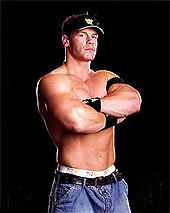 So, just what do you want people who don't know about the profession, to know about wrestling? "That it supplies the best entertainment, I believe, in the world. While the Hollywood writers are on strike, we'll be taping live. Saturday Night Live, they tape at 8 and air at 11. David Letterman tapes at 6 and they air it late. We do it live. We have a seven-second delay, similar to a live sporting event. The goal of a sporting event is to win."
So, just what do you want people who don't know about the profession, to know about wrestling? "That it supplies the best entertainment, I believe, in the world. While the Hollywood writers are on strike, we'll be taping live. Saturday Night Live, they tape at 8 and air at 11. David Letterman tapes at 6 and they air it late. We do it live. We have a seven-second delay, similar to a live sporting event. The goal of a sporting event is to win."
"The goal of what we do is to captivate the people every week. We have a track record of unbelievable ratings with the USA network, with Sci-Fi and with CW. We have unbelievable fans. We are a serious company and we demand respect, but we're kind of caught in between. We don't get any respect from the sports world, we don't get any respect from the entertainment industry. I just wish that they would all just sort of shut up and recognize that what we do holds a place in sports and entertainment."
So, what’s the secret that allows an All-American center at Division III Springfield College to push on through to make it as one of the most popular WWE Superstars of all time? "You know what, I don't necessarily know if it's a secret, but it's being myself. And not being afraid to fail. I've tried so many things that haven't worked and I've tried a few things that have worked. It's just the ability to accept failure. The ability to be humbled at times. The ability to just screw up. A lot of people they work so hard to achieve a certain goal and then when they reach that goal they become comatose. And so for them that's the end of their ladder."
"But my ladder doesn't have an end to it and I'm gonna do whatever I can do to try and keep going higher. I've always been open and honest with people and I think that's what gained a lot of their respect. I'm not afraid to fail. I have nothing else. This is what I do. This is what I want to do. This is where I belong."
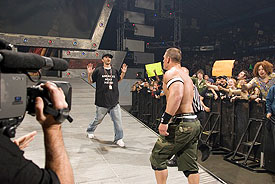 2007 began with you ending your ‘feud’ with Kevin Federline, but in reflection do you regret having been a part of that whole promotion and the way it was down played within the media? "I think, in retrospect, that it began to accomplish what the WWE wanted to accomplish: to become a mainstream name. To get the household popularity and get the respect that we deserve. I don't want to say we rely on that kinda help, but it's not a bad thing to have a bunch of famous superstars that the people are familiar with on your program."
2007 began with you ending your ‘feud’ with Kevin Federline, but in reflection do you regret having been a part of that whole promotion and the way it was down played within the media? "I think, in retrospect, that it began to accomplish what the WWE wanted to accomplish: to become a mainstream name. To get the household popularity and get the respect that we deserve. I don't want to say we rely on that kinda help, but it's not a bad thing to have a bunch of famous superstars that the people are familiar with on your program."
"The Kevin Federline thing was basically a foray into that and for that purpose it served that purpose. But I just don't know if Kevin Federline was the right choice. But, I did it with open arms ... it's not like I refused to do it. But I think with a little bit more hard work we could have gotten somebody else."
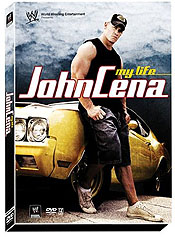 Please tell us more about your involvement with your new DVD, 'My Life' "I just did the basic concepts. I know that the WWE traditionally does biographical DVDs on its superstars, and I really think my best stories are yet to be told or experienced, so I didn’t really want to do an extensive career record. But we put some interesting stuff in there, and it’s a different look from the usual WWE format. This was a different way of doing things.”
Please tell us more about your involvement with your new DVD, 'My Life' "I just did the basic concepts. I know that the WWE traditionally does biographical DVDs on its superstars, and I really think my best stories are yet to be told or experienced, so I didn’t really want to do an extensive career record. But we put some interesting stuff in there, and it’s a different look from the usual WWE format. This was a different way of doing things.”
What do you think that fans will be most surprised with on this DVD? "The Five Questions stuff is what I think they'll be most surprised with. Although it was extremely popular on the Internet - we've received anywhere from 250,000 and 400,000 questions per week - it was the only WWE internet show that was live, no reruns for about a year and a half straight. It takes a few hours to watch, it's a long watch. It starts out with me answering questions and then towards the end it really turns into a journal of life. It's a very funny, unadulterated, in-your-face journal. It has me being frustrated, me being happy, me being sad. It really turned into something I was very proud of because I can watch it and look back on it and you can see there were the tough times and you can be there when I was having a great day. It gave fans a real good look on my life, week by week. I think that's the one thing they'll be most intrigued by, but it takes a little to watch it because it's over two hours long!"
These days do you have any say in how your character develops now that you're such a big star in the ring? "Yeah, I do have a lot of say in this character. The problem with our industry and any industry that showcase's talent, a lot of times people are afraid to take risks. They work so hard to make it to a certain level that they enter into a comfort zone. I'm never ever satisfied with staying in one place. Even as the WWE becomes more successful, I'm always seeing new places for it to go; for it to grow. Places that I can personally take things to another level."
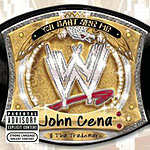 And another level was as a rap artist! "Yeah, well, I'm always trying to redefine myself. Whether it be through actions or just how I speak. Right now it's easy as I really do get to be myself. The hip-hop thing was just really one facet of my personality. It was a very one-dimensional thing. I dressed the part, I looked the part, I was the part. Now after three or four years of just acclimatizing into who I am as a person, I've been able to just walk out there and be me ... and have a great time."
And another level was as a rap artist! "Yeah, well, I'm always trying to redefine myself. Whether it be through actions or just how I speak. Right now it's easy as I really do get to be myself. The hip-hop thing was just really one facet of my personality. It was a very one-dimensional thing. I dressed the part, I looked the part, I was the part. Now after three or four years of just acclimatizing into who I am as a person, I've been able to just walk out there and be me ... and have a great time."
“It wasn’t even my idea. I was pretty much dressed as all of the other wrestlers. It was a pretty generic time for the WWE, so it was kind of caught in a transition. Just to pass the time, there’s a lot of waiting in our industry, so one of the things I did to pass the time was rap. Our creative department got wind of this and it basically became an exploitation of a hobby. They asked if I would like to do it on television and I said, ‘absolutely.’ It would give who I was some identity and some character, and from then on… it started as a joke and then they really let me go with it, and it was all just about how serious I wanted to take it. If I wanted to make myself look like a joke, it would be up to me, but I really felt this is my way to identify with the fans, good, bad, or indifferent, and I really ran with it.”
How do you see your own cross-over appeal as compared to what The Rock has achieved? "As a matter of fact, there are movies in the works, it’s just that the cross-over appeal depends on the ticket buyer. A lot of it rests on my shoulders, but also on WWE Films to get good scripts and put together good movies. It’s definitely something I’m looking forward to continuing and I don’t know if I’m going to follow in The Rock’s footsteps of leaving WWE behind. I guess I’m loyal to a fault. I don’t see myself leaving the ring any time soon.”
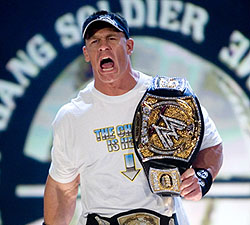 What can you tell us about your recent tearing of the pectoral muscle and the rehab process that has followed? "I’m on my way to rehab right after this phone call ... it sucks! I was going on a schedule where I was literally going seven days a week, going to a different city every night and I'd been doing that kinda of routine for six years. And I had been lucky enough to stay injury free. And I was doing what I felt was my best work and I felt that with the company [WWE] being so strong that I had a lot to do with that. I was actually injured the week before a giant PPV match for the WWE championship so I couldn't compete in that match. It was really a freak accident that happens a lot in any physical contact. It was something that I never wished had happened and is something that really makes you appreciate what you have. I never took my time in the ring for granted, but I've never felt that I want to be back in there so bad. It's something that I have to deal with."
What can you tell us about your recent tearing of the pectoral muscle and the rehab process that has followed? "I’m on my way to rehab right after this phone call ... it sucks! I was going on a schedule where I was literally going seven days a week, going to a different city every night and I'd been doing that kinda of routine for six years. And I had been lucky enough to stay injury free. And I was doing what I felt was my best work and I felt that with the company [WWE] being so strong that I had a lot to do with that. I was actually injured the week before a giant PPV match for the WWE championship so I couldn't compete in that match. It was really a freak accident that happens a lot in any physical contact. It was something that I never wished had happened and is something that really makes you appreciate what you have. I never took my time in the ring for granted, but I've never felt that I want to be back in there so bad. It's something that I have to deal with."
So the injury was ring-based? "Yes, this was the worst one I've had and it was ring-based. And just to give you an idea of exactly how the attitude of a sports entertainer goes, I tore my pec about two minutes into a scheduled match and continued to wrestle twenty minutes into that same match. It's just another one of these things that shows the passion of our performers."
But you didn't need this down time?! "Yeah, I didn't need any rest," he laughs. "It's not like I tore my pec to get some rest," he laughs again. "Right now I can do everything else in my training regiment except anything on the right side. I’m five weeks off of the table right now. The first two weeks that you’re off the table you really just have to keep the muscles working as best you can, like isometric exercises where there’s no movement at all. We also use electronic stimulation to cut down on atrophy. From two to four weeks is when the incision cleans up and things can start going right with very minimal movement. My right pec is torn, so it’s usually the healthy side doing the work for the injured side. Basically, you’re getting the range of motion back. At four weeks you can do more and more things. I can finally hold a dumbbell in my right hand and I can do some shoulder raises, lateral raises, and front raises."
"I’m using a lot of AeroBand, which is a way to overload the shoulder at certain points. I still can’t do any bench press. I’ll probably be able to do chest work eight weeks out because that’s the point where the tendon is actually fused back to the bone and the surgeon as well as the rehab folks are really not worried about re-tearing that pec. So the first eight weeks are kind of pivotal. From then on it depends on how much I want to hustle to get back to being strong again. I would say it will be three months from now until I’m working out in a practice setting for wrestling.”
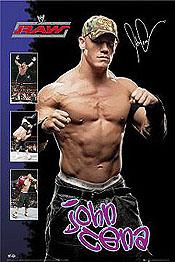 What's the best advice you would give somebody to get into the profession and start to make something of themselves? "First off, they need to find the right place to train. This is something that I wish I had known about earlier in my life. I started out in a school in California and then went to people's back yards! There's two decent schools - one in Tampa, Florida and the one that I trained in Louisville, Kentucky. That's a great place to start. They run weekend seminars where you can really just see if it's for you. And from them on you just have to be consistent. As with every profession from the start, the roads aren’t all paved with gold. You have to go through your share of months before you start getting any steam and then it's just a matter of how far you want to take it."
What's the best advice you would give somebody to get into the profession and start to make something of themselves? "First off, they need to find the right place to train. This is something that I wish I had known about earlier in my life. I started out in a school in California and then went to people's back yards! There's two decent schools - one in Tampa, Florida and the one that I trained in Louisville, Kentucky. That's a great place to start. They run weekend seminars where you can really just see if it's for you. And from them on you just have to be consistent. As with every profession from the start, the roads aren’t all paved with gold. You have to go through your share of months before you start getting any steam and then it's just a matter of how far you want to take it."
For those that don't know, when it comes to winning WWE championship belts, how much is it you the athlete winning the bout and how much is it a programmed affair with a set destination from moment number one? "Well, if I have to answer that question I have to start talking about Santa Clause and the Easter Bunny," he laughs. "Like I said before, sports entrainment is just that: Sports and Entertainment. What we do is for the grace of our fans and the shows that we put on, and the scenarios that unfold are strictly to entertain our fans. So that's our one and only mission. That's how the company is set up. That's the best I can do to answer that question."
Is there one bout that stands out for you thus far as being the go-to one for you for whatever reason? "I think that every single performer that I've been in the ring against has brought out a facet in me that the fans have wanted to see. I couldn't label just the one performer, the one athlete, the one specific bout. I think every single match I always say that you're only as good as your next match and not your last match. I think that every opponent that's ever stepped into the ring with me knows that I really want to go in and do the best I can. I think match-by-match it was a process of convincing fans - whether I'm your favorite or not - that I'm always the guy who goes in there and does the best that he can. And so I just think that I was paired with a lot of great guys in a row that really made that happen."
Finally, what's the next muscle car you're hunting for?! "I’m actually trying to hunt down a Saturn Yellow, 1971 four-speed Buick GSX, Stage 1.”
Interviewed by Russell A. Trunk
www.JohnCena.com
www.WWE.com
Back To Archives

